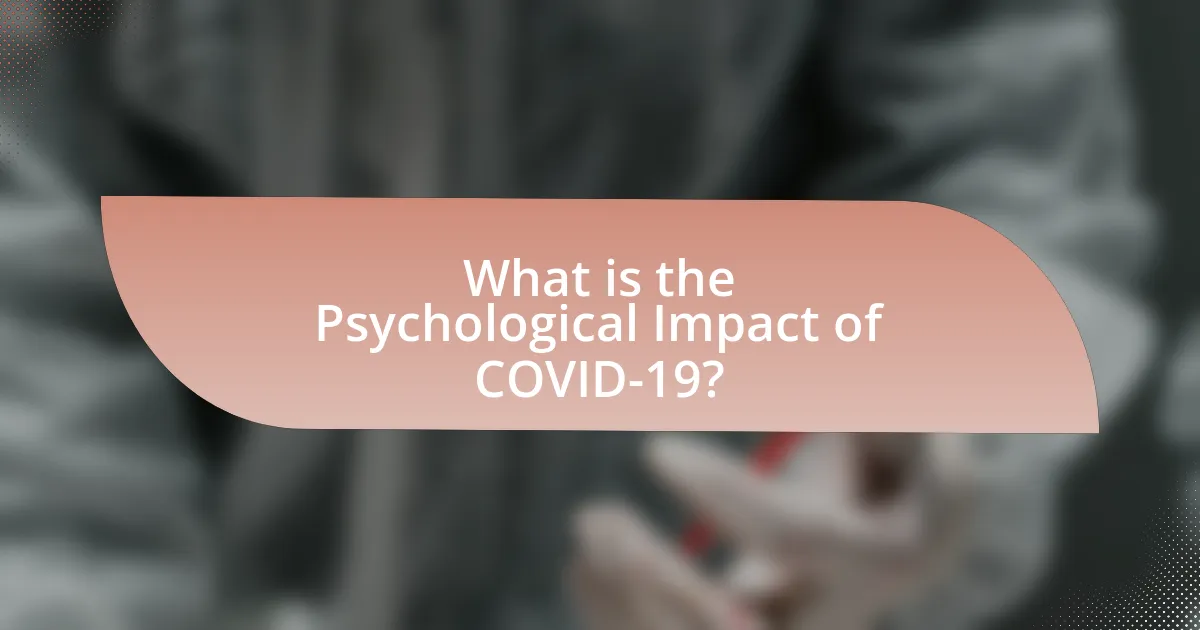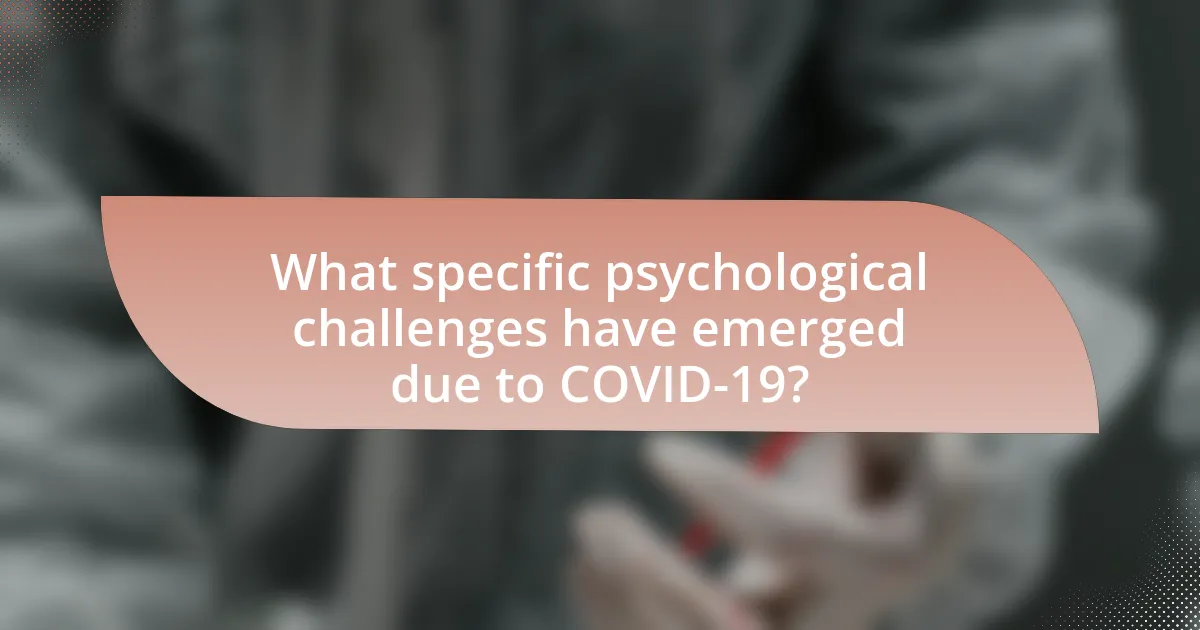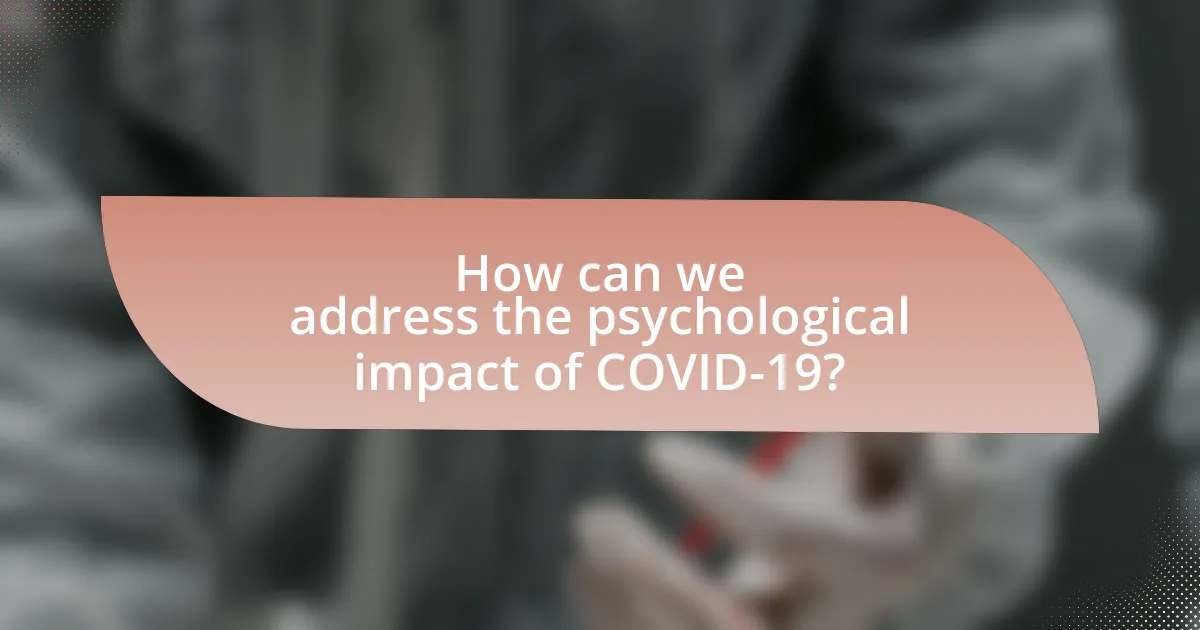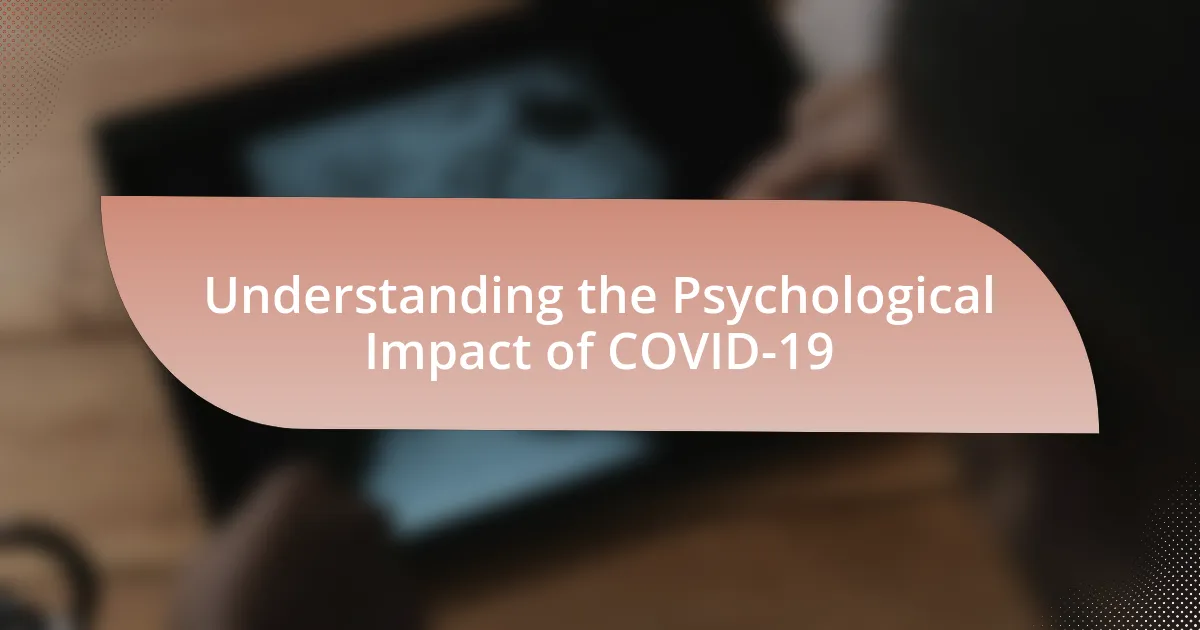The article focuses on understanding the psychological impact of COVID-19, highlighting the significant increase in anxiety, depression, and stress among individuals globally. Research indicates that 78% of adults reported substantial stress due to the pandemic, with mental health issues rising by over 25% during this period. It examines how different demographics experience these psychological effects, the long-term consequences of mental health disorders, and the importance of tailored interventions. Additionally, the article discusses coping mechanisms, the role of social support, and available mental health resources to address the challenges posed by the pandemic.

What is the Psychological Impact of COVID-19?
The psychological impact of COVID-19 includes increased anxiety, depression, and stress among individuals. Research conducted by the American Psychological Association in 2020 found that 78% of adults reported significant stress due to the pandemic, with many experiencing heightened feelings of isolation and uncertainty. Additionally, a study published in The Lancet Psychiatry indicated that the prevalence of anxiety and depressive disorders surged during the pandemic, with rates increasing by 25% globally. These findings underscore the profound mental health challenges posed by the pandemic, affecting various demographics and leading to long-term psychological consequences.
How has COVID-19 affected mental health globally?
COVID-19 has significantly worsened mental health globally, leading to increased rates of anxiety, depression, and stress-related disorders. A study published in The Lancet Psychiatry in 2021 reported that the prevalence of anxiety and depression symptoms rose by more than 25% during the pandemic. Additionally, the World Health Organization noted that the pandemic has disrupted mental health services in 93% of countries, exacerbating existing mental health issues and creating new challenges for populations worldwide.
What are the common psychological symptoms observed during the pandemic?
Common psychological symptoms observed during the pandemic include anxiety, depression, and stress. Research conducted by the World Health Organization in 2020 indicated that the prevalence of anxiety and depression increased significantly due to factors such as social isolation, fear of infection, and economic uncertainty. Additionally, a study published in JAMA Network Open found that 40% of adults reported experiencing symptoms of anxiety or depressive disorder during the pandemic, highlighting the widespread psychological impact of COVID-19.
How do different demographics experience psychological impacts?
Different demographics experience psychological impacts of COVID-19 in varied ways due to factors such as age, socioeconomic status, and pre-existing mental health conditions. For instance, older adults often face increased anxiety and depression due to isolation and health concerns, while younger individuals may struggle with uncertainty about their future and job security. Research published in the journal “Psychological Medicine” indicates that individuals from lower socioeconomic backgrounds report higher levels of stress and anxiety, exacerbated by financial instability and limited access to mental health resources. Additionally, marginalized communities have experienced disproportionate psychological effects due to systemic inequalities and higher exposure to the virus, as highlighted in a study by the American Psychological Association. These demographic differences underscore the need for tailored mental health interventions to address the unique challenges faced by each group during the pandemic.
Why is understanding the psychological impact of COVID-19 important?
Understanding the psychological impact of COVID-19 is important because it directly influences public health outcomes and individual well-being. Research indicates that the pandemic has led to increased levels of anxiety, depression, and stress among various populations, with studies showing that approximately 30% of individuals reported significant psychological distress during the pandemic (Pfefferbaum & North, 2020, “Mental Health and the COVID-19 Pandemic”). Recognizing these psychological effects is crucial for developing effective mental health interventions and support systems, which can mitigate long-term consequences on mental health and improve overall community resilience.
What are the long-term consequences of mental health issues related to COVID-19?
The long-term consequences of mental health issues related to COVID-19 include increased rates of anxiety, depression, and post-traumatic stress disorder (PTSD). Research indicates that individuals who experienced COVID-19 or its associated stressors are at a higher risk for these conditions. A study published in The Lancet Psychiatry found that 1 in 5 COVID-19 survivors developed a mental health disorder within 90 days of infection, highlighting the significant psychological impact of the pandemic. Additionally, prolonged social isolation and economic uncertainty during the pandemic have exacerbated existing mental health issues, leading to a rise in substance abuse and suicidal ideation. These findings underscore the need for ongoing mental health support and interventions for those affected by the pandemic.
How can awareness of these impacts improve public health responses?
Awareness of the psychological impacts of COVID-19 can significantly enhance public health responses by enabling targeted interventions that address mental health needs. Recognizing issues such as increased anxiety, depression, and social isolation allows health authorities to implement specific support systems, such as mental health hotlines and community outreach programs. For instance, a study published in the journal “Psychological Medicine” found that 31% of respondents reported psychological distress during the pandemic, highlighting the urgent need for mental health resources. By understanding these impacts, public health officials can allocate resources more effectively, tailor communication strategies, and foster resilience in communities, ultimately leading to improved overall health outcomes.

What specific psychological challenges have emerged due to COVID-19?
The specific psychological challenges that have emerged due to COVID-19 include increased anxiety, depression, and stress-related disorders. Research conducted by the American Psychological Association in 2020 found that 78% of adults reported significant stress due to the pandemic, with many experiencing heightened feelings of isolation and uncertainty. Additionally, a study published in The Lancet Psychiatry indicated a rise in mental health issues, particularly among frontline healthcare workers, who faced increased rates of anxiety and post-traumatic stress disorder (PTSD) due to their exposure to the crisis. These findings underscore the profound psychological impact of the pandemic on various populations.
How has social isolation influenced mental well-being?
Social isolation has significantly negatively influenced mental well-being by increasing feelings of loneliness, anxiety, and depression. Research conducted by the American Psychological Association indicates that prolonged social isolation can lead to a decline in mental health, with studies showing a 30% increase in anxiety and depressive symptoms among individuals experiencing isolation during the COVID-19 pandemic. Furthermore, the World Health Organization reported that social distancing measures have exacerbated pre-existing mental health conditions and created new challenges for individuals, particularly among vulnerable populations.
What coping mechanisms have people adopted during isolation?
People have adopted various coping mechanisms during isolation, including increased use of technology for social connection, engaging in physical activities, and practicing mindfulness techniques. Research indicates that many individuals turned to video calls and social media to maintain relationships, which helped mitigate feelings of loneliness. Additionally, studies show that physical exercise, such as home workouts or outdoor activities, became a popular way to manage stress and improve mental health. Mindfulness practices, including meditation and yoga, were also widely adopted, as they provided tools for emotional regulation and stress relief during uncertain times.
How does loneliness correlate with anxiety and depression during the pandemic?
Loneliness significantly correlates with increased levels of anxiety and depression during the pandemic. Research indicates that individuals experiencing loneliness are more likely to report symptoms of anxiety and depression, as social isolation exacerbates feelings of distress and helplessness. A study published in the journal “Psychological Medicine” found that loneliness was a strong predictor of mental health issues, with 20% of participants reporting heightened anxiety and depressive symptoms directly linked to feelings of isolation during COVID-19. This relationship underscores the importance of social connections in maintaining mental well-being, particularly in times of crisis.
What role does uncertainty play in psychological distress during COVID-19?
Uncertainty significantly contributes to psychological distress during COVID-19 by heightening anxiety and fear among individuals. Research indicates that the unpredictability of the pandemic, including fluctuating infection rates and changing public health guidelines, exacerbates feelings of helplessness and worry. A study published in the journal “Psychological Medicine” found that individuals experiencing high levels of uncertainty reported increased symptoms of anxiety and depression, highlighting the direct correlation between uncertainty and mental health challenges during this crisis.
How can individuals manage anxiety related to uncertainty?
Individuals can manage anxiety related to uncertainty by employing cognitive-behavioral strategies, mindfulness practices, and establishing routines. Cognitive-behavioral strategies help individuals identify and challenge negative thought patterns, which can reduce feelings of anxiety. Mindfulness practices, such as meditation and deep breathing exercises, promote present-moment awareness and can alleviate stress. Establishing daily routines provides a sense of control and predictability, which is particularly beneficial during uncertain times. Research indicates that these approaches can significantly lower anxiety levels, as evidenced by a study published in the Journal of Anxiety Disorders, which found that cognitive-behavioral therapy effectively reduces anxiety symptoms in various populations.
What strategies can help mitigate fear of infection and health concerns?
Cognitive-behavioral strategies can effectively mitigate fear of infection and health concerns. These strategies include reframing negative thoughts, practicing mindfulness, and engaging in problem-solving techniques. Research indicates that cognitive-behavioral therapy (CBT) can reduce anxiety and improve coping mechanisms in individuals facing health-related fears, as demonstrated in a study published in the Journal of Anxiety Disorders, which found that CBT significantly decreased anxiety levels in patients with health anxiety. Additionally, maintaining accurate information through reliable sources can help counter misinformation, further alleviating fears associated with infection.

How can we address the psychological impact of COVID-19?
To address the psychological impact of COVID-19, implementing mental health support services is essential. These services can include teletherapy, support groups, and community outreach programs that provide resources and coping strategies. Research indicates that mental health issues, such as anxiety and depression, surged during the pandemic, with a study published in JAMA Network Open revealing that 41% of adults reported symptoms of anxiety or depressive disorders in June 2020. By increasing access to mental health care and promoting awareness of available resources, individuals can receive the necessary support to cope with the psychological effects of the pandemic.
What resources are available for mental health support during the pandemic?
Mental health support during the pandemic is available through various resources, including teletherapy services, hotlines, and online support groups. Teletherapy platforms like BetterHelp and Talkspace provide access to licensed therapists via video calls, messaging, or phone, ensuring individuals can receive professional help from home. Additionally, the National Alliance on Mental Illness (NAMI) offers a helpline that provides free support and information about mental health issues. The Substance Abuse and Mental Health Services Administration (SAMHSA) also has a national helpline available 24/7 for individuals seeking assistance. Furthermore, many local community organizations have adapted their services to offer virtual support groups, allowing individuals to connect with others facing similar challenges. These resources have been crucial in addressing the increased mental health needs during the COVID-19 pandemic.
How can teletherapy and online resources be effectively utilized?
Teletherapy and online resources can be effectively utilized by providing accessible mental health support through virtual platforms, enabling individuals to receive therapy from the comfort of their homes. This approach has been validated by studies indicating that teletherapy can reduce barriers to access, such as geographical limitations and stigma associated with in-person visits. For instance, a study published in the Journal of Psychological Disorders found that teletherapy is as effective as traditional face-to-face therapy for treating anxiety and depression, demonstrating a 70% satisfaction rate among users. Additionally, online resources, such as mental health apps and educational websites, can supplement therapy by offering self-help tools, coping strategies, and community support, further enhancing the overall mental health care experience during challenging times like the COVID-19 pandemic.
What community initiatives have emerged to support mental health?
Community initiatives that have emerged to support mental health include virtual support groups, mental health hotlines, and community wellness programs. These initiatives have been developed in response to the increased mental health challenges faced during the COVID-19 pandemic. For instance, organizations like the National Alliance on Mental Illness (NAMI) have expanded their helplines and online resources to provide immediate support. Additionally, local community centers have launched wellness programs that offer mindfulness sessions and stress management workshops, aiming to foster resilience and connection among individuals. These efforts are crucial as studies indicate that mental health issues surged during the pandemic, highlighting the need for accessible support systems.
What practical steps can individuals take to improve their mental health during and after COVID-19?
Individuals can improve their mental health during and after COVID-19 by engaging in regular physical activity, maintaining social connections, practicing mindfulness, and seeking professional help when needed. Regular physical activity has been shown to reduce symptoms of anxiety and depression, as evidenced by a study published in the Journal of Clinical Psychiatry, which found that exercise can significantly improve mood and overall mental well-being. Maintaining social connections, even virtually, helps combat feelings of isolation, as research from the American Psychological Association indicates that social support is crucial for mental health. Practicing mindfulness techniques, such as meditation and deep breathing, can reduce stress and enhance emotional regulation, supported by findings from the Journal of Happiness Studies that highlight the benefits of mindfulness on mental health. Lastly, seeking professional help, such as therapy or counseling, is essential for those experiencing severe mental health challenges, as indicated by the World Health Organization’s recommendations for mental health support during crises.
How can mindfulness and self-care practices be integrated into daily life?
Mindfulness and self-care practices can be integrated into daily life by establishing a routine that includes dedicated time for mindfulness exercises and self-care activities. For instance, individuals can start their day with a 10-minute meditation session, which has been shown to reduce stress and improve mental clarity, as evidenced by a study published in JAMA Internal Medicine that found mindfulness meditation can significantly improve anxiety, depression, and pain. Additionally, incorporating short breaks throughout the day for deep breathing or stretching can enhance focus and emotional well-being. Engaging in self-care activities, such as journaling or taking a walk in nature, can further promote mental health, as research indicates that nature exposure is linked to reduced stress levels. By consistently practicing these techniques, individuals can effectively manage the psychological impacts of stressors, including those related to COVID-19.
What role does social support play in recovery from psychological impacts?
Social support plays a crucial role in recovery from psychological impacts by providing emotional, informational, and practical assistance, which can significantly enhance coping mechanisms. Research indicates that individuals with strong social support networks experience lower levels of anxiety and depression, particularly in the context of stressful events like the COVID-19 pandemic. A study published in the journal “Psychological Medicine” found that social support mitigates the adverse psychological effects of stressors, promoting resilience and better mental health outcomes. This evidence underscores the importance of social connections in facilitating recovery from psychological distress.
What are the best practices for maintaining mental health in a post-pandemic world?
To maintain mental health in a post-pandemic world, individuals should prioritize social connections, establish routines, and engage in physical activity. Research indicates that social support significantly reduces feelings of isolation and anxiety, which have increased during the pandemic. A study published in the Journal of Affective Disorders found that maintaining regular social interactions can enhance emotional well-being. Additionally, creating structured daily routines helps provide a sense of normalcy and predictability, which is crucial for mental stability. The American Psychological Association emphasizes that regular physical activity releases endorphins, improving mood and reducing stress. Therefore, integrating social engagement, routine establishment, and physical exercise are essential practices for mental health in the current context.


